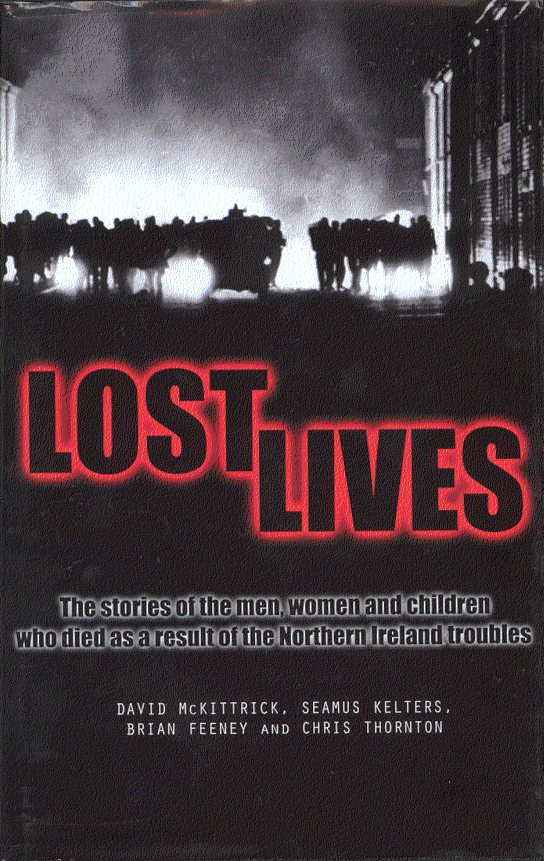I published this post on last year’s Memorial Day, on my old blog. Somehow, it feels only fitting to repost it again – so little has changed.
Some years ago, a team of authors released a book:
The book documents, without exception, every single human being who died in that conflict. The order is chronological, and no one is excluded. Paramilitaries who blew up on their own bombs share a page with a baby killed when a bullet from a shoot-out near its home penetrated a wall and then its cradle. Soldiers lured into a honey-trap and shot in the head by the side of the road are listed next to the victims of Bloody Sunday. The hunger strikers, people incinerated in a firebomb attack on a country-club restaurant, militants killed in gunshot battles with police, policemen executed in their own homes by their townspeople, and the Miami Showband are all on the pages of the book, just as they fell. Each and every person is given a few paragraphs: What did he or she do, how they was killed, a word or two from a family member. There is no discrimination. It is a profoundly humbling, sobering read.
3 ,524 people are in that book. Not one of them needed to die.
As Israel now walks through its own shadowy vale of national commemoration, I can’t help thinking how petty and exclusivist we are. The Israeli papers list accurate numbers every year. Included are primarily soldiers, and then Israeli civilians killed by Palestinians. Palestinian Israelis killed by Israeli security forces out of the game. Even Jewish victims of terrorist attacks by Palestinian militias are often excluded from commemoration ceremonies; somehow, they are considered second rate.
No West Bank, Gaza or diaspora Palestinians are mentioned in any official ceremony or media roll-call.
I don’t like commemoration ceremonies. As a journalist and an active citizen I remember the dead of the conflict every day; falling into line with ceremonies orchestrated by the state feel artificial at best, nauseating at worst, as if I was recognising the moral authority of those responsible for so many deaths – both Israeli and Palestinian, both military and civilian – to loftily conduct ceremonies of national grief and take charge of private mourning.
But on a day like this I can’t help but recall an imaginary roster of unnecessarily lost lives. Teenage girls killed in a street bombing in Tel Aviv; several score children bombed out by Israeli fighter jets in Qana in Lebanon; author Ghassan Kanafani, assassinated in Beirut with his niece; an Israeli soldier who gave chase in his tank after Hezbollah guerrillas who abducted his comrades and was blown up by a roadside mine; soldiers blown to shreds on the notorious Philadelphy route, and soldiers sniped at as they crawled in the dust to collect the bodies; a settler child, hacked by an ax-weilding Palestinian villager from down the road; Palestinian families extinguished by a single air-to-ground rocket slam; settler families executed by gunmen; demonstrators shot by their own police; a young lawyer woman, who had lost several family members to Israeli gunfire, and blew herself up in a seaside restaurant, killing families with children; guerrillas fighting tanks with AK47s; international activists who volunteered as human shields; Palestinian civilians who didn’t volunteer as human shields but who were forced into the roles anyway, whether by Israeli troops or by their paramilitary compatriots; collaborators, real and imaginary, shot, stabbed, and thrown off roof tops by fellow Palestinians; Israeli peace activists, assassinated by compatriots scared out of their wits.
Every single one of them – civilian, paramilitary, soldier, Arab, Jewish, refugee, suicide bomber, settler – was a unique, irreplaceable individual, whose loss cannot be compensated. Before consciously or unwittingly becoming part of that roster, they had ambitions, dreams, sins and loves, homes, rooms, books, songs and families. Not one of them needed to die.
In recognition of that, I think it’s time we in Israel-Palestine compile our own book of lost lives – be it in print or online – to remind ourselves not the ethos of the deaths of those who we lost, but their humanity. Every single one.
But all the while, let us keep working together, across political and national borders to ensure the roster doesn’t grow. Grief and guilt alone can never be a substitute for constructive action.


